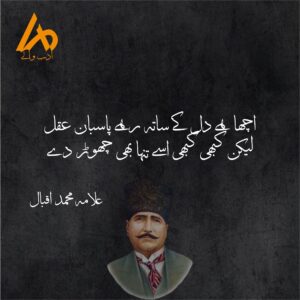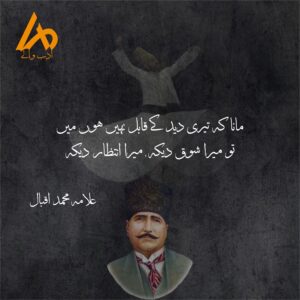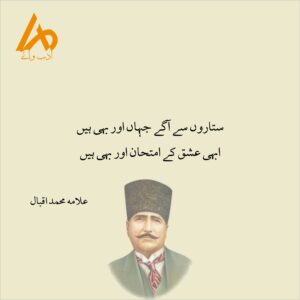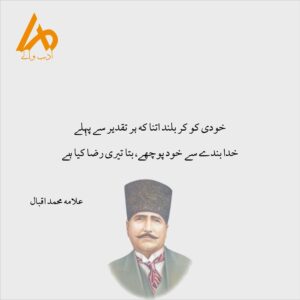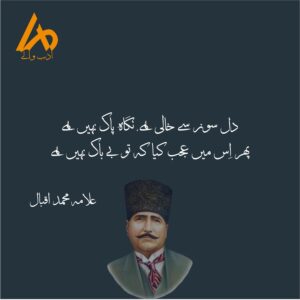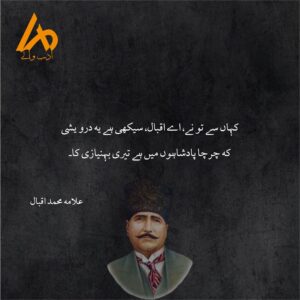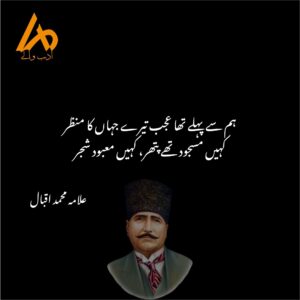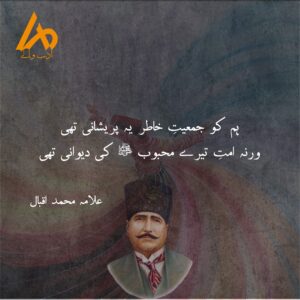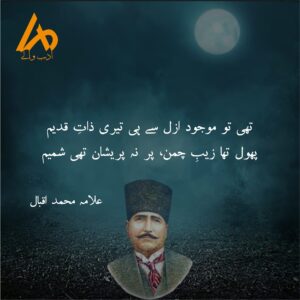Category: Allama Iqbal
Allama Iqbal, born Muhammad Iqbal in 1877, was a philosopher, poet, and politician who played a pivotal role in the intellectual and political development of South Asia in the early 20th century. Often referred to as Mufakkir-e-Pakistan (The Thinker of Pakistan) and Shair-e-Mashriq (The Poet of the East), Iqbal’s contributions to literature, philosophy, and nation-building have left an indelible mark.
Iqbal’s poetry is a powerful blend of mysticism, philosophy, and a deep love for his homeland. His work reflects a profound engagement with Islamic thought, Sufism, and Western philosophy. Iqbal’s ghazals and poems convey a spiritual message, urging individuals to seek self-realization, embrace their cultural heritage, and strive for a just and progressive society.
One of Iqbal’s most famous works is “Bang-e-Dra” (The Call of the Marching Bell), a collection of poems that explores themes of self-discovery, social justice, and the revitalization of the Muslim world. In his famous poem “Lab Pe Aati Hai Dua Ban Ke Tamanna Meri” (My Heart’s Desire Comes to My Lips as a Prayer), Iqbal emphasizes the importance of moral and ethical values in shaping the destiny of a nation.
Allama Iqbal’s vision for an independent Muslim state in the Indian subcontinent laid the intellectual foundation for the creation of Pakistan. He is often regarded as the “Spiritual Father of Pakistan” for his role in inspiring the Pakistan Movement. Iqbal’s concept of “Khudi” (selfhood) became a guiding principle for individuals to cultivate self-awareness, integrity, and a sense of responsibility.
Iqbal’s philosophical work, particularly “The Reconstruction of Religious Thought in Islam,” addresses the challenges faced by Muslims in the modern world and advocates for a reinterpretation of Islamic philosophy in the context of contemporary issues. His ideas on the importance of independent thinking, dynamic ijtihad (interpretation), and the reconciliation of science and faith continue to influence discussions on Islam and modernity.
Allama Iqbal’s impact extends beyond his literary and philosophical contributions. He was actively involved in politics and served as the president of the All India Muslim League in 1930. His famous Allahabad Address in 1930 presented the idea of an independent Muslim state, providing the ideological groundwork for the eventual creation of Pakistan in 1947.
علامہ اقبال: اردو شاعری کے شاہنشاہ
علامہ اقبال، جس کا اصل نام محمد اقبال تھا، 1877 میں پیدا ہوئے تھے اور 20ویں صدی کے ابتدائی دہائیوں میں جنوب ایشیا کی فکری اور سیاستی ترقی میں ایک رہنمائی کردار ادا کرنے والے شاعر، فکریچر اور سیاستدان تھے۔ انہیں مفکرِ پاکستان اور شاعرِ مشرق کہا جاتا ہے، اور ان کی شاعری اور فلسفے نے اردو زبان کو ایک نیا سماجی، فکری اور قومی چہرہ دینے میں اہم کردار ادا کیا۔
اقبال کی شاعری میں عرفانیت، فلسفہ، اور اپنے وطن سے محبت کا خوبصورت مرکز ہے۔ ان کا کلام اسلامی فکر، صوفیائی اصولوں، اور مغربی فلسفے کی گہرائیوں سے بھرا ہوا ہے۔ اقبال کی غزلوں اور نظموں میں انسانوں کو خود شناسی، اپنی ثقافتی ورثے کی قدر کرنے، اور ایک نیک و ترقی یافتہ معاشرت کی راہوں پر چلنے کی ترغیبات چھپی ہوتی ہیں۔
اقبال کی مشہور ترین کتاب “بانگِ درا” ہے، جو خود کو دریافت کرنے، سماجی انصاف، اور مسلمان دنیا کی تجدید کے موضوعات پر مبنی ہے۔ ان کی مشہور نظم “لب پہ آتی ہے دعا بن کے تمنا میری” میں اقبال نے اخلاقی اور اخلاقی قیمتوں کی اہمیت پر زور دیا ہے، جو قومی مستقبل کو شکل دینے میں اہم ہیں۔
علامہ اقبال کا خواب انڈیپینڈنٹ مسلم ریاست کے لئے نظریہ بنا، جس نے بعد میں پاکستان کی بنیاد رکھی۔ انہیں عام طور پر “پاکستان کے روحانی والد” کہا جاتا ہے، اور ان کا تصور “خودی” (خودی) افراد کے لئے اہمیت رکھتا ہے تاکہ وہ خود شناسی، ایمانداری، اور ذمہ داری کا راہنمائی اصول بنا سکیں۔
علامہ اقبال کا فلسفی کام، خاص طور پر “اسلام میں دینی تفکر کی ترتیب” میں، مسلمانوں کو جدید دنیا میں مواجہہ ہونے والے چیلنجز کے بارے میں گفتگو کرتا ہے اور اسلامی فلسفے کو معاصر مسائل کے سیاق و سباق میں تشریع کرنے کی ترویج دیتا ہے۔ ان کے خیالات میں خود مختار سوچ، متحرک اجتہاد (تشریح)، اور سائنس اور ایمان کے مصالحہ کی مصالحت جاری ہے جو اسلام اور جدید دنیا کے حوالے سے مباحثات پر اثر انداز ہیں۔
علامہ اقبال کا اثر ان کی ادبی اور فلسفی مدد کے علاوہ بڑھ کر ہے۔ انہوں نے سیاست میں فعال حصے لیا اور 1930 میں الہ آباد کے خطاب میں آزاد مسلم ریاست کے خواب کو پیش کیا، جو نظریہ کا ماحول بنا کر 1947 میں پاکستان کی بنیاد رکھا۔
علامہ اقبال کا خواب، انسانی تجربے کی گہرائیوں اور زندگی کی حقیقتوں کی شناخت میں ایک مستقبل کا راہنمائی کرنے والا ہوتا ہے۔ ان کی شاعری اور فکری تجاویز زمانے کو گزرنے والے میٹروپولیٹن معاشرت میں بھی اہمیت رکھتی ہیں، جو اچھی طرح سے دیکھی گئی ہیں اور آئندہ کو روشن کرتی ہیں۔

